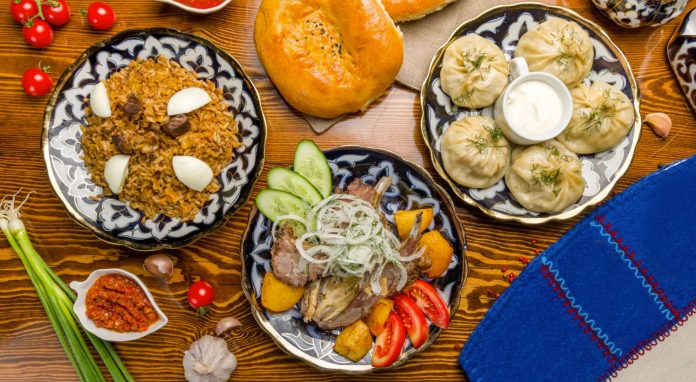
One Thursday fall evening, 40 of my family’s closest relatives and friends trickled into a restaurant, where platters of salads and spreads densely packed over long tables greeted them. A large portrait of my late grandfather hung, front and center, on the wall. That week marked 25 years since his death and, as per Bukharian tradition, we were hosting an annual yushevo, or memorial dinner, in his honor.
The tradition developed throughout the centuries as a method of secretly learning prayer while simultaneously honoring the deceased — Bukharian Jews resided in Central Asia under Islamic and then Soviet sovereignty, which restricted their religious freedom. Today, most of the Bukharian community resides in New York or Israel, and we have carried on the yushevo for its spiritual and cultural significance. Throughout my childhood, I had always been kept from such somber events, but given that I was 17 and nearing adulthood, I was finally invited to participate in my first one.
Before we ate, we carried out the religious traditions that comprise a yushevo. Much of the Bukharian community follows traditional or Orthodox Jewish practices, so the men sat on one side of the room and the women on the other. One by one, each woman went up to the front of the restaurant to light a candle for my grandfather, whispering “may he rest in peace” in Bukhori as the wick caught fire. Meanwhile, the men swayed back and forth in unison as they recited the Maariv (evening) prayer facing the easternmost wall of the restaurant; some also came up to light their own candles. It took about an hour for prayers and candle lighting to finish.
Unlike most of our religious meals, this one did not commence with reciting of the hamotzi blessing over bread — there was one strange-looking dish that needed to be consumed before the rest. White platters containing large masses of wavy, bubbly, paper-thin fried dough with powdered sugar dusted on top were laid across the tables. Each platter was adorned with sugar cubes and raisins. The oldest man in the room, one of my grandfather’s closest friends, said the mezonot blessing, and we all bit into the crunchy sweetness.
Of the many dishes on the table, this is the one non-negotiable necessity. The puffed-up fried dough, called kushelik in Bukhori, hvorost in Russian and angel wings in English, symbolizes the ascendance of a person’s soul into heaven. While angel wings are utilized in numerous traditions across various cultures and communities, in the Bukharian yushevo they serve to remind us that this meal is unlike any other family gathering — that my grandfather’s memory must always stay with us.
The same elderly man recited the hamotzi blessing over Uzbek lepyoshka, a round, soft, chewy bread. He ripped chunks from the bread, salted them and passed them around to every guest. Even though we were technically allowed, as per Orthodox tradition, to start eating other dishes at this point, we waited patiently in anticipation of what is perhaps the most important part of any yushevo: telling the stories of the deceased person’s life.
As we continued to nibble on the angel wings, guests began to recall their most fond memories of my grandfather — how he helped his sisters with their homework, excelled at his engineering job, and facilitated his entire extended family’s immigration to America. As I listened to my older relatives tell his stories, I was awed by the extent of my grandfather’s humility, intelligence and unwavering desire to help family and friends. Although I never had the chance to meet him, I felt an incredible connection to him, knowing that I was a continuation of the heavy legacy he carried.
For a long while, nobody ate anything else. We simply listened to the stories and finished the remnants of the bread and the angel wings. But slowly, people began to dig into the salads and spreads, allowing themselves to chat quietly in-between speeches. At last, the waiters brought out the hot dishes, which included dumplings called manti filled with spiced ground beef and onions, samosa — savory triangular flaky pastries stuffed with ground meat and paired with a spicy tomato sauce, and various grilled meats.
Although it was the least filling, the angel wings were my favorite dish of the evening. They represented so much more to me than their sweetness; they reminded me of the power that stories have to bring a person’s memory back to life, even after they had long gone. By the end of the evening, I knew a little more about who I was and where I came from. Most of all, I gained a deep appreciation for the respect that my culture holds for our ancestors, one that I hope to pass down.
credit to myjewsihlearning.com









